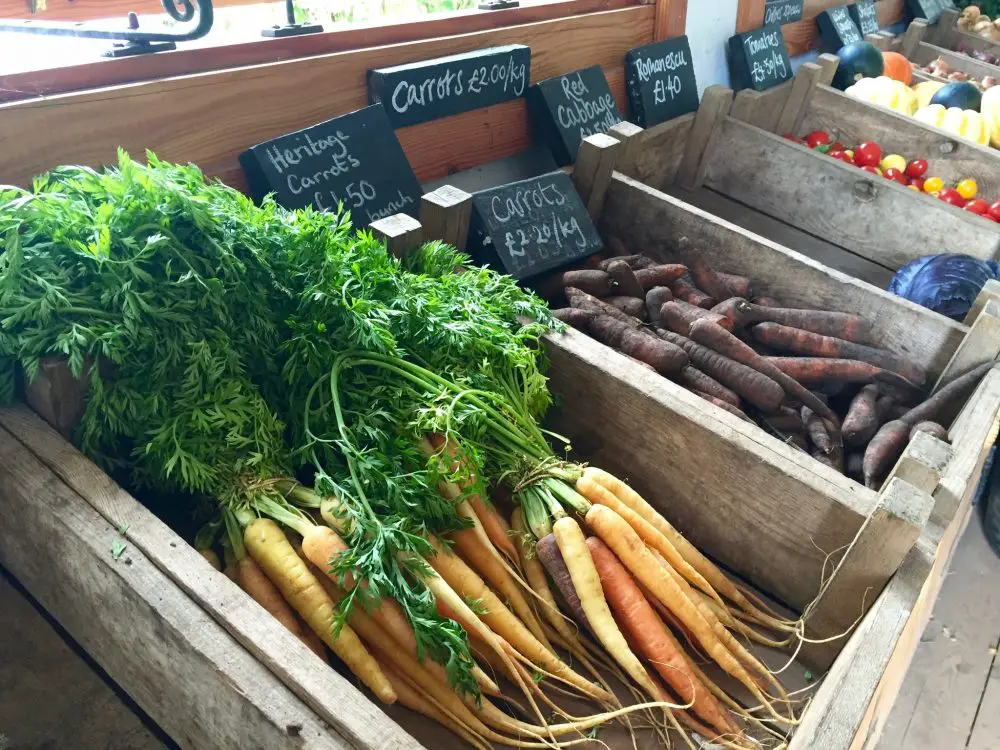
Whilst I’m not perfect, I have always tried to avoid wasting food. I’m pretty sure I’m below average when it comes to the amount which goes into my kitchen bin. The kinds of things that I used to throw away were bags of salad (the #1 offender) so now I buy whole lettuce instead, cheese and fruit – especially apples and bananas.
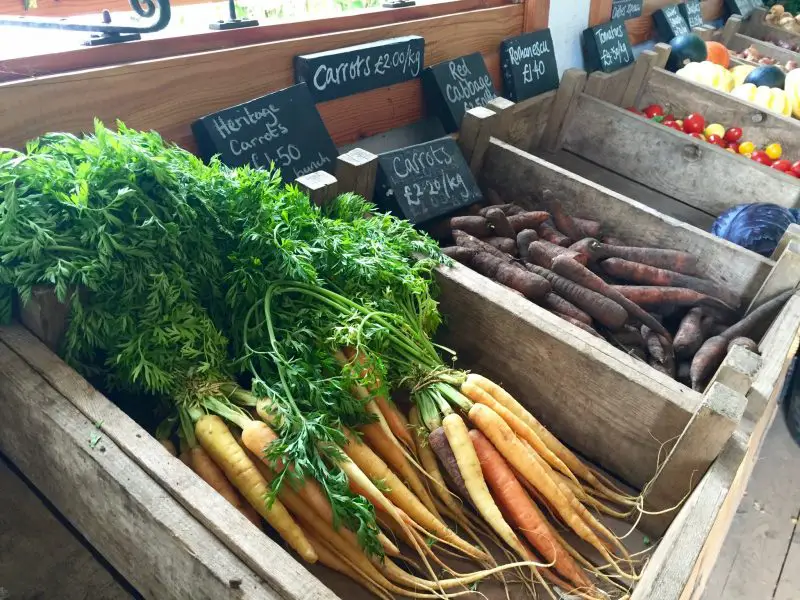
Cutting down on food waste is something I’ve been thinking about a lot recently and this is a post I’ve been meaning to sit down a write for a while. Here are my thoughts on ways in which we can all help cut down on food wastage at home:
Leftovers
Being able to cook helps a lot with food waste because I can look at what I’ve got and how far I can push it before it’s truly gone ‘off’. Sod the packet dates, use your nose! I’m a dab hand when it comes to conjuring up random meals with leftovers and although I usually refrain from sharing these meals on the blog and social media, perhaps in truth, I should!
I’m a big fan of leftovers and often cook with more than one meal in mind. For example, a roast chicken or joint of meat will often produce 2 or even three meals if you’re savvy. Veggies on the turn are great for soups or roasting. Cheese always lasts longer than the packet says and using a parmesan rind in soups, stocks and even whilst cooking a risotto can give great flavour. Use stale bread to make breadcrumbs and keep them in an airtight jar or stew soft fruits and eat with ice cream or cream and obviously overripe bananas are perfect for banana bread. If you’re unsure where to start, this River Cottage book on leftovers is a good investment and will show you the ropes!
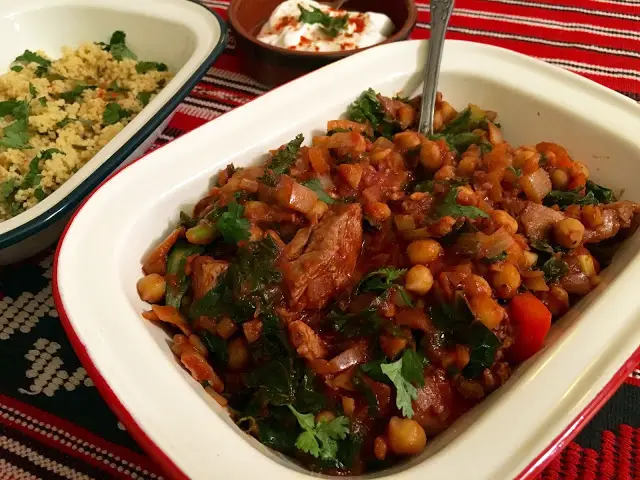
Here are a few of my favourite leftover recipes:
- Harissa Lamb Stew – with chickpeas and kale.
- Turkey Pilaf – perfect for Christmas.
- Cheeseboard Pie – another festive good’un.
- Chicken, Leek & Barley Soup – the best use for leftover roast chicken!
- Miso Soup with Leftover Chicken – another one for chicken!
Using the freezer
Batch cooking is the way forward – and buying reduced food when you see it to cook up dishes for the freezer. Beef mince is a big favourite of mine and it freezes well. If you cook up a big pot of something like vegetable soup using veggies on the turn and don’t eat it all, freeze a portion and have it the following week. This old Dinner in the Freezer cookbook has come in useful for me before now.
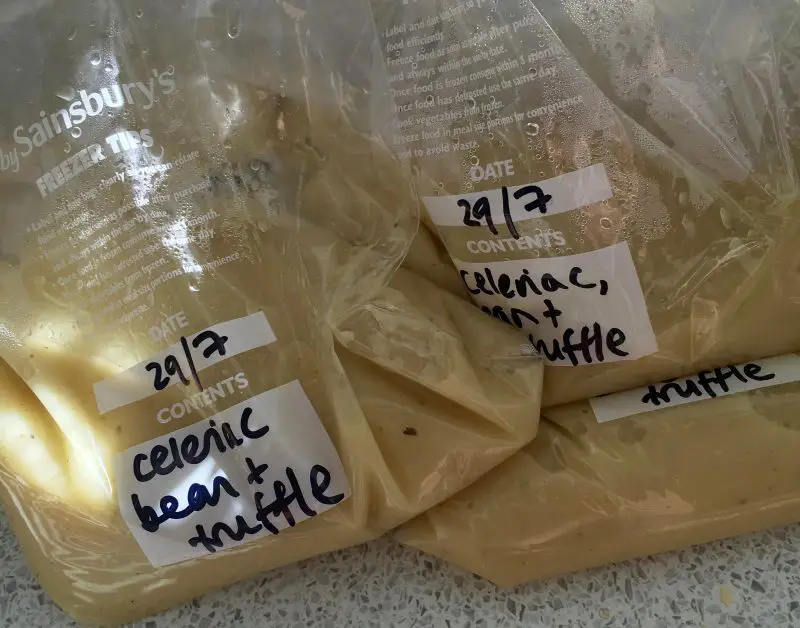
Although I talk later on about choosing smaller shopping trips over big ones, I do enjoy the occasional rummage through the reduced section in the big supermarkets if I’m nearby on an evening. I tend to go for meat and fish which I can freeze but remember you can also freeze bread, milk, butter and pastry.
Meal planning
Fans of Gingey Bites will know that I love to meal plan. I’ve been writing them on and off for years. I find it helps to plan what we’re eating for a number of reasons – to keep to budget, to try and eat healthily and for stock control on what have in!
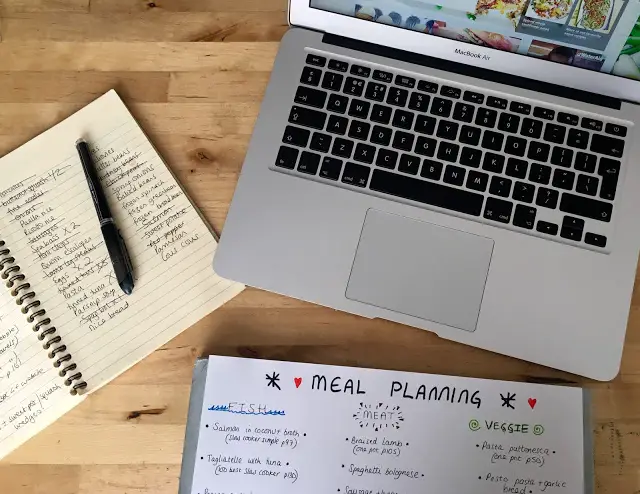
When it comes to meal planning, I start by writing a list of everything I already have in. Starting with the cupboards and ending with the fridge and freezer. From there I look at whether there are any meals I can make already. Believe me, it’s much easier to see a meal when the ingredients are listed down on paper than it is when you’re tired and hangry on a Wednesday night! From there you can then list new ingredients which you need to buy for the week ahead.
See my collection of previous meal plans for inspiration here!
Local food delivery schemes
Using local food box deliveries like Riverford, Farmdrop et al can help prevent buying more than you need. At the supermarkets, we can get sucked into offers for giant bags of spuds, carrots and onions. These always (for me anyway) results in more food wastage. By connecting the end user with local farms and producers these delivery boxes are making it easier than ever for busy people to shop locally without the time involved in trawling around the shops.
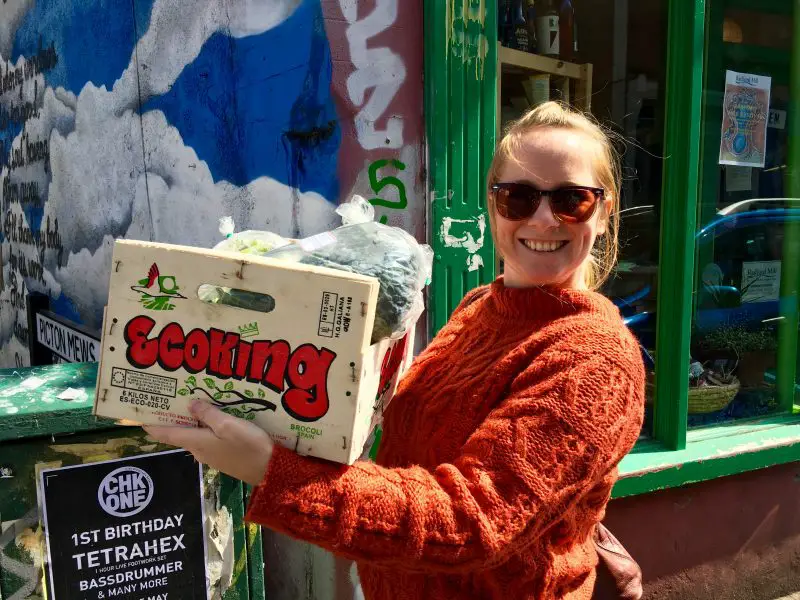
If you’re Bristol based, I really love Good Sixty and can’t recommend what they’re doing enough. They’ve teamed up with some great local producers and cafes to offer a collection and delivery service. And, many of them offer boxes designed for 1 weeks worth of food for 2, 4 or a family. Plus if you’re a Great Food Club member (and if you’re not, why not?), they also have a brilliant offer for members here.
If you’re London based, I recently read this article in the Independent about a new start-up called Oddbox. They’re offering wonky veg boxes, using veg that would be rejected by supermarkets and might otherwise end up wasted. A brilliant idea and one that I’m sure will be really popular. After all, who cares if their carrot isn’t perfectly straight? It’s the taste that counts.
Use the olio app
I discovered Olio earlier this year and I just love what they’re doing. In fact, I’ve just signed up to become a volunteer for them. Olio is an app designed to connect neighbours, shops and cafes to swap and share leftovers and food they don’t want or need. It could be a tin of soup from someone down the road or a surplus of home-grown courgettes.
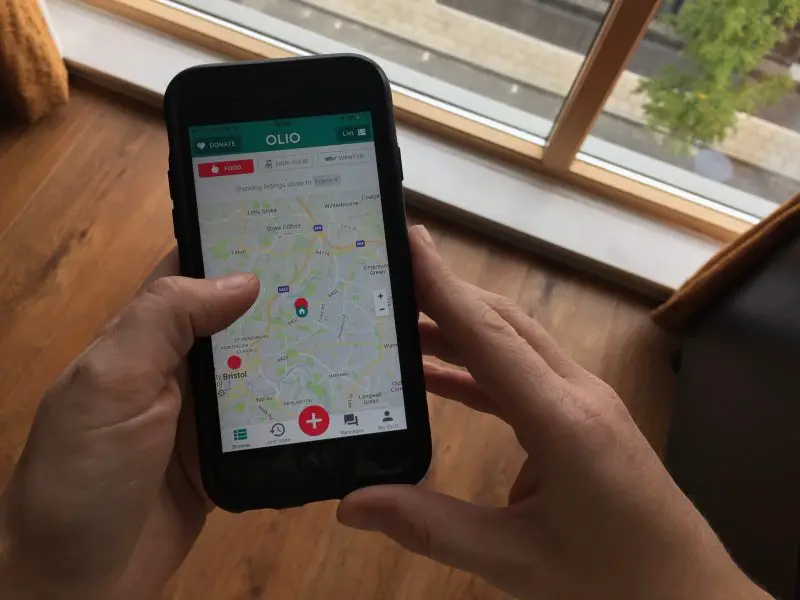
“In the UK the average family throws away 22% of their weekly shop, worth £700 a year”
I’ve used it to give away food we don’t want and to collect items too. It might be someone like me, or perhaps someone living below the breadline or homeless and really needs it. There are drop off boxes around the city as well as of course, collection directly from people’s homes. I think this is such a great idea and have a look almost daily to see what’s been listed nearby. If it saves something from the bin, it’s well worth a look, right?
I’m also now the Bristol volunteer team leader and we’re working in partnership with Morrisons Cribbs Causeway to distribute food which would otherwise go to landfill. It’s early days but I’m really excited to be involved!
Smaller shopping trips
It’s rare for us to do a ‘big shop’ these days. Aside from the fact that we move house frequently due to our house sitting lifestyle, I find that a big shop often results in more waste. Using a meal plan alongside smaller shopping trips works really well. You know what you’ve already got in and can just supplement it with things you need to complete each meal. Avoiding the big supermarkets also helps you avoid the big deals designed to encourage you to buy more than you often need.
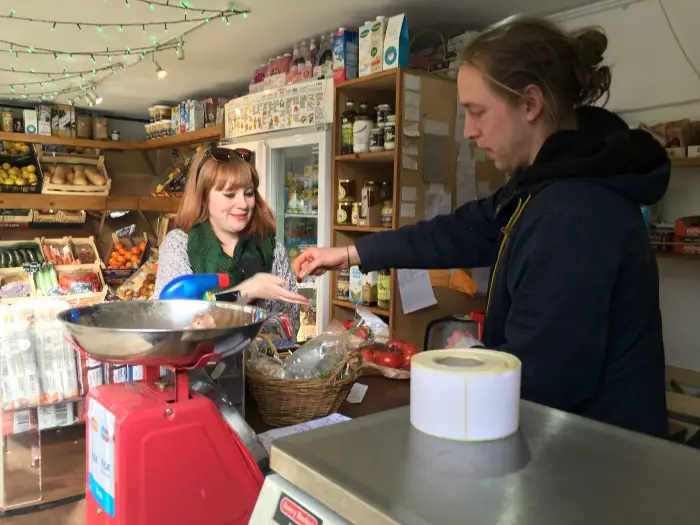
Shopping on a smaller scale is also great for shopping more locally. I’d much rather buy my veg from a farm shop than a big supermarket. I like to know where it’s come from and usually, it’s not very far. I love Radford Mill Farm Shop in Montpelier and Bear Fruit in the Bearpit (pictured above) among others around Bristol.
Let’s start cutting down food waste together!
So there you go, the ways in which I’m cutting down food waste. If you want even more, try this blog post on how we try to live a zero food waste life. Do you have any comments, tips or advice? I’d love to read them in the comments section below!



With meal planning I start by listing the meat or meals I have already in the freezer. Then, I’ll give myself a night or two ‘off’ with something already made from the freezer and/or an (almost a weekly favourite) omelette. There’s usually a curry in the mix too (somewhere). I won’t do two nights in a row of the same meat and I try to avoid doing the same carb in a row too (bread, pasta, rice etc). After that, it’s trying to add things I fancy eating and then shop for that. My cupboard usually has a stash of tinned tomatoes and coconut milk (with an emergency pesto and baked beans!) but I tend to shop to my meal plan.
As for the smaller shopping trips… in Germany I’m at the supermarket a couple of times a week (not least because I can’t get everything I want in one place!). I get meat from the market in Munich and store it in the freezer in portioned out food bags. When I’m in the UK I use a company like Field and Flower, then do a single weekly shop. It’s just too much to fit in going to a supermarket multiple times when working full time – and I lacked a quality farm shop in my area!
I totally agree and do my best to avoid food waste. These tips are a great reminder!
I love all of the info you packed into this! Leftovers, in my opinion, are sometimes even better than the original! Those leftover recipes sound so delicious, will definitely give one a try as soon as the opportunity presents itself!
Thank you, I’m glad you found them useful! I often just throw leftovers into curries and stews too, no recipes in particular just stick it in and see what happens!
Love all these tips! I really try hard not to waste food but there’s always more we could do
I always feel so bad when I end up binning food. And that’s why I like to buy frozen veg, fruit and meat as it really does reduce the amount of waste! I also recently discovered Olio, I downloaded it but didn’t really use it yet but love the idea.
Like you, I’m also keen on avoiding food waste. I use many of the techniques you’ve mentioned, but I love the idea of the unsaleable produce — the uglier the better in my book! Who needs perfect, I’d much rather have something unique looking.
Yes! And often the ugly veg is just as tasty if not more so! All hail ugly veg! 🙂
Lots of fab tips Alex. When are you going you make me this cheeseboard pie? 😀
Teeheee.. well to be honest, I need to have leftover cheese in the first place! It’s a good Crimbo recipe 🙂
Great tips! I’m definitely guilty of sometimes throwing away old veggies I find at the back of the fridge. Need to do better!
Thanks Becca! Veggies are the worst offenders – i have some bendy carrots in mine right now.. :-O
I absolutely hate wasting food, so this speaks to me! I find planning meals, as you’ve also suggested, and sticking to your shopping list is the best way for me to make sure I eat the food I buy. And making meals based on leftovers is key too, sometimes you have to get a little creative though!
I love the sound of Olio, I haven’t heard of it but it’s great. I always have so much excess from my veg patch in the summer and my neighbours have apple and pear trees and can never get rid of it all
Olio is bigger in London so it’s worth having a look and seeing if there is anything near you! A great way to share food and stop waste!